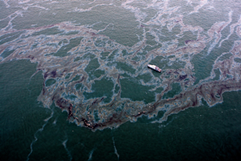Responding to marine pollution incidents is a highly technical task, requiring specialized knowledge and expertise, as well as dedicated equipment and tools that are fit for purpose. The OPRC 90 and OPRC-HNS Protocol 2000 collectively set out the international legal framework and requirements for oil and HNS pollution preparedness and response. However, more practical technical guidance is needed for those tasked with building robust national response systems for pollution response.

Taking into account these requirements and recognizing that there are varying levels of knowledge and capacity that exists amongst State Parties to the OPRC 90 and OPRC-HNS Protocol 2020, IMO has developed a wide array of tools and practical guidance to assist countries in developing response capacity.
Much of this guidance was developed through the Organization’s OPRC-HNS Technical Group, a former subsidiary body of IMO’s Marine Environment Protection Committee (MEPC), one of IMO’s main technical bodies. This Group brought together marine pollution response experts from Member States and Observing Organizations worldwide to share experiences, lessons learned and identify best practices and new technologies and advancements in preparing for and responding to oil and HNS incidents at sea.
The Technical Group held its final meeting in 2014 having developed an array of resources to assist countries in all facets of pollution preparedness and response. This has included the development of model training courses, manuals and guidance documents, IMO circulars and other relevant resources and materials. Currently, this work continues through the work of the Pollution Prevention and Response (PPR) Sub-Committee.
The many resources developed through IMO are routinely used in the implementation of activities delivered through the Organization’s
ITCP
. Additionally, these manuals, guidance documents and model training courses are offered for purchase through
IMO Publishing
.